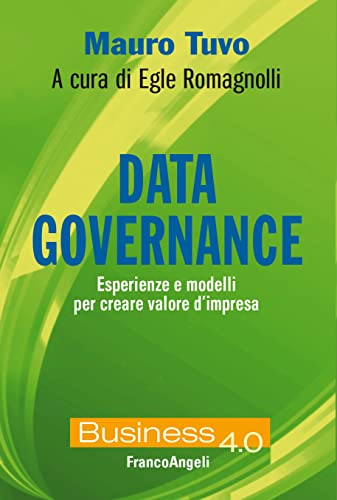
By 2025, the European Commission predicts a 530% increase in the volume of data produced globally: 175 zettabytes compared to 33 in 2018. How do we manage this exponential growth and organize appropriately and not be overwhelmed by an information “flood”? And how to turn data into tangible value for businesses? That is, how much is information worth and how do we make sure that (in addition to being “correct”) it makes a concrete contribution to business, quantifiable even in economic terms?
These questions are answered in depth in the book “Data Governance. Experiences and models for creating business value” published in FrancoAngeli‘s Business 4.0 series, written by Mauro Tuvo (Irion Principal Advisor) and edited by Egle Romagnolli (Irion Head of Marketing), thanks also to the 20 testimonials and contributions of ‘data leaders’ from important Italian companies, from the financial sector to energy and utilities. Author proceeds are donated to la Lega del Filo d’Oro. In recent years, the world of data management (the management of data in organizations) has been animated by profound debates on the latest paradigms and architectural frameworks needed to govern the enormous amount of information produced by every organization today, often processing data coming in from countless internal and external sources and in different formats.
From metadata to AI
Hence the need for “clarity,” from someone who has dedicated his entire career to helping dozens of Italian and foreign companies in protecting and enhancing their information assets. Just to mention some of the necessary steps in such a project: defining business standards and policies, designing and implementing organizational and operational models of data management, drafting instrumental requirements to support data management and governance processes.
A practical example: metadata (defined as “information that describes various aspects of an information asset, to improve its usability during its life cycle”) as essential components of a Data Governance presidium, make this activity critical to responding to regulations such as the Artificial Intelligence Act, the pioneering European standard on AI. Data Governance and AI are important to organize and optimize the work of data professionals (e.g., “data engineers”) by decreasing manual tasks and reducing processing time. Also because a “data scientist” (the expert in data analysis strategies) cannot work properly if certain quality controls have not been passed: Data Quality is among the cornerstones of governance. According to recent research by Politecnico di Milano‘s Big Data & Business Analytics Observatory, poor data quality and integration is the most cited obstacle (35%) to implementing Advanced Analytics projects.
Five key steps for data governance
Sectors such as Finance, i.e., banking and insurance, have more experience on this front due to regulatory requirements (the demands of authorities such as the ECB and Bank of Italy), but energy and utilities, manufacturing and other production or service areas are also gearing up. As Roberto Monachino (former Chief Data Officer at Unicredit) points out, there are “five key steps in a successful data governance journey” namely:
- Data quality in identified reports
- Logical model and data catalog
- Universal semantic glossary
- Trust and socialization
- Trust and socialization
Tuvo and Romagnolli have been working for many years on methods for quantifying the economic value of data and are co-authors (with Franco Francia, university professor and vice president DAMA Italy; Elena Testoni, information governor Credem Banca; and Stefano Zoni, chief data & analytics officer Credem Banca) of the free white paper “Value Based Data Governance – A Model for Driving Data Governance to Serve Enterprise Value” published by Irion and Credem in 2022.
Contributions and testimonials in the book
- Fabio Baraghini (head of data platform, Unipol Group)
- Denis Benati (data analytics & intelligent automation, Hera Group)
- Noemi Brattico (head of data governance office, BCC Iccrea Group)
- Fabio Decontardi (former CDO, Il Sole 24 Ore – head of data quality & valorization Generali Jeniot)
- Giovanni Deretta (principal management consulting financial services, KPMG Advisory)
- Irene Di Deo (senior researcher, Big Data & Business Analytics Observatory, Politecnico di Milano)
- Simona Di Felice (partner, SCAI Partners Management Consulting – head of media & communications DAMA Italy, board member AIEA)
- Giovanni Fendillo (chief data officer, Cedacri)
- Luca Fioretti (data quality risk management, Reale Mutua Group)
- Franco Francia (adjunct professor, managerial systems for performance UniMORE – vice president, DAMA Italy – senior partner INEMA and FIT Strategy)
- Stefano Gatti (head of data analytics, Nexi – co-author “The Culture of Data” and AI expert)
- Alessandro Giaume (general manager, 4cLegal – editor of Business 4.0 FrancoAngeli series)
- Gianluca Grilli (data management manager, Reale ITES)
- Giuseppe Mastrodomenico (data governance manager, Gruppo Iren)
- Roberto Monachino (executive data leader in Banking and former CDO – senior advisor Deloitte Consulting)
- Monica Ripoldi (head of data quality, Banco BPM)
- Marco Rotoloni (IT & operations and artificial intelligence coordinator, ABI Lab)
- Alberto Scavino (CEO, Irion)
- Giovanni Scavino (chairman, Irion)
- Fabio Schiera (senior data expert, former group head of data governance and reporting management MPS)
- Renato Valera (head of consulting & solution, Irion)
- Stefano Zoni (chief data & analytics officer, Credem Group)


